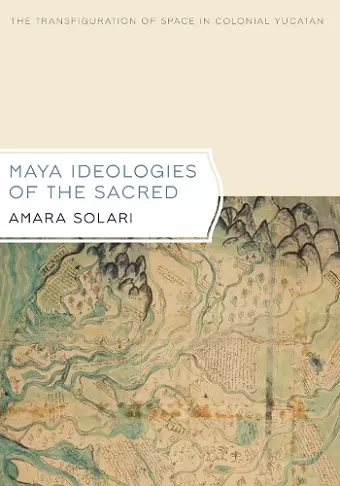Maya Ideologies of the Sacred
The Transfiguration of Space in Colonial Yucatan
Format:Hardback
Publisher:University of Texas Press
Published:1st Jul '13
Currently unavailable, and unfortunately no date known when it will be back

"I thoroughly enjoyed reading this book, and I can strongly and enthusiastically recommend it... To my knowledge, no scholar of Maya art history has undertaken such a monumental study of the meaning of space in colonial Maya art and architecture using the framework of spatial theories ... The analysis here is fruitful and very illustrative of local indigenous responses to the imposition of Catholicism and the colonial Maya agency involved in refashioning, or restructuring, of sacred spaces in the colonial context... Solari has successfully challenged some of the field's most basic concepts concerning the nature of Catholic conversion and the Maya reception/rejection/adaptation of Catholicism and its understanding of all things sacred... This book has the possibility ... of becoming one of the standard works on the study of colonial Maya art history." -- John F. Chuchiak IV, Rich and Doris Young Endowed Professor of Colonial Latin American History, Missouri State University; author of The Inquisition in New Spain, 1536-1819: A Documentary History
Using the Maya city of Itzmal as a case study, this book explores how indigenous conceptions of space and landscape both aided and subverted the Franciscan evangelical effort in Colonial Yucatan.
As Spaniards built colonies in the New World, men of the cloth saw within ancient ruins and inhabited native towns great potential for easing the colonization effort. In the Yucatan, which is the locus of this study, Franciscan friars seized upon the opportunity to “conquer” Maya places for Christianity. Their practice of remaking a Maya town into a Christian town—often building their church on the very foundations of an ancient sacred site—represented the absolute triumph of their religion, the ultimate defeat of the pagan demonic forces by the true faith.
This book addresses the Franciscan evangelical campaign of sixteenth-century Yucatan and investigates how Maya conceptions of space, landscape, and history influenced the conversion strategies adopted by the friars. Amara Solari analyzes colonial manuscripts written in Yucatec Mayan to discern how Maya communities conceived of land (and more abstractly, space) and how they encoded space with cultural significance. She demonstrates how these indigenous understandings of space and its history, a locale’s “spatial biography,” made the transference of sacrality possible. Using the Maya city of Itzmal as a case study, Solari examines the process of transferring sacrality and healing abilities from the Maya deity Itzamnaaj to a numinous statue of the Virgin Mary. She also reveals how the hybrid religious ideology that evolved allowed the native Maya population to subvert colonial political and religious programs and maintain community identity in the early years of the colonial period.
Solari’s skillful use of diverse sources—visual, textual, and architectural—in Spanish and Yucatec Maya makes Maya Ideologies of the Sacred a compelling interdisciplinary study that contributes to the fields of art history, colonial Latin American history, Maya studies, anthropology, architecture, and spatial theory. * CAA Reviews *
ISBN: 9780292744943
Dimensions: 254mm x 178mm x 25mm
Weight: 739g
244 pages